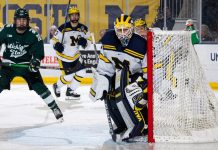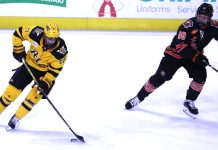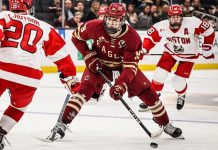Half of the teams in the ECAC Hockey League began their season a week ago while the other half — the six ECACHL schools that are also Ivy League institutions — won’t officially take the ice for their first regular-season games until a full three weeks later.
While not every conference in the country has a common start date for all its league members, the three-week gap between games of the non-Ivies and the Ivies is seen nowhere else in college hockey. As a result, it creates an un-level playing field during the opening months of the season. Exactly who that un-level playing field favors, though, is very much open to interpretation.
“I think it’s a distinct disadvantage [to start late],” said Harvard coach Ted Donato.
“After four or six games — which is what the difference is sometimes when we meet the other teams — it’s a huge difference, especially on special teams,” he continued.
“It’s obviously a disadvantage [to start later], but that’s what we’ve always dealt with; it’s nothing new,” agreed Cornell coach Mike Schafer.
Even for a veteran coach like Schafer, the Ivy League’s later start date has an obvious impact — both in terms of ice time at practice and in terms of games played — during the first few weeks of the season.
“You go into [the season opener] knowing you’re going to be far from perfect,” he said. “You’re a long way from where you want to be at the end of the season.”
And early this season at the ECACHL Media Day, Schafer stressed the challenges of getting off to a strong start, especially when you are facing teams that have already utilized weeks’ worth of practices and games to improve. He highlighted his team’s season opener on October 28 at Lynah against the Michigan State Spartans.
“Michigan State will be a real test for us because we’ll have like five practices under our belts and that’ll be practically their seventh and eighth games,” Schafer said.
Other coaches from around the league see the opposite side of the coin, instead emphasizing the disadvantages of starting early in October and noting the advantage that a later start date gives down the line.
“The Ivies get a longer training camp with their team,” said Union coach Nate Leaman.
“For us, we only get one week of practice — and a short week at that because this year we were on the road and had to travel [to Colorado],” he added.
“For myself, who’s seen it from both sides, it’s a lot tougher than what the Ivies have to deal with.”
Leaman’s experience on both sides of the fence comes from his current stint as head coach of Union, which began at the start of the 2003-04 season, and from his four seasons as an assistant coach at Harvard with former head coach Mark Mazzoleni. And despite the opinions of Donato and Schafer, Leaman is not alone in thinking that a later start is actually an advantage for the Ivy League teams.
“The Ivies start [practices] only 15 days later, so it’s only a disadvantage early on in the season,” Brown coach Roger Grillo said. “But our guys are maybe a little fresher later on in the season. And there’s more time to get our kids in hockey shape [at the start].”
Woes Out West … For Union
While Joe Marsh’s St. Lawrence Saints were splitting a pair of overtime decisions at Wisconsin, Union and Quinnipiac were both facing their share of difficulties as young teams playing in hostile road environments.
“We went out [to Colorado Springs] and competed with an extremely young team,” said Leaman. “We had 12 freshmen and sophomores in our lineup, and only four seniors. We had four defensemen who didn’t play Division I hockey last year.
“We made some real fundamental mistakes,” he added. “We’re hopefully going to take experience from last week and try to learn from it.”
A second-period collapse — five goals allowed, including two power-play goals — doomed Union’s chances against Colorado College, but what frustrated Leaman and his team more than the opening night struggles against CC was the poor defensive play and netminding against Air Force during the second night of the Icebreaker Tournament.
“Against Air Force it was tough because after the first period the scoring chances were five-to-five but the score was 5-0,” Leaman said.
Leaman pulled sophomore goaltender Justin Mrazek after a first period where he allowed five goals on 14 shots, but by that point the damage had been done.
And For Quinnipiac, Some Woes As Well …
Quinnipiac’s first assignment as a member of the ECAC Hockey League was to travel to Ann Arbor, Mich., for a pair of games against the Wolverines. Not an easy assignment, especially after coach Rand Pecknold lost 10 of his veteran players to graduation last spring. What might have been just as challenging for Pecknold’s young team as the players lined up across the ice was the intimidating environment in which they found themselves.
“Yost Ice Arena, I would consider it one of the toughest places to play in college hockey,” Pecknold said. “It’s such a hostile environment; it’s packed and the students like to get into it, and like to agitate.”
“Our competitiveness was solid on the weekend, but there were a few lapses,” Pecknold said. “There were a lot of cobwebs, on both sides. The power plays especially — they just weren’t crisp.”
The Bobcats went 0-for-6 with the man-advantage on opening night, and then posted a 2-for-10 success rate during a tightly-called second game.
Despite the 3-1 and 5-3 losses, the experience — both of playing a team like Michigan and playing within a hostile environment — was one of the positives that Pecknold identified.
“We played them tough,” Pecknold said. “I was really hoping that we could squeak out a win or a tie on the weekend.”
“Michigan is a very good team, certainly one I expect to be in the Top 5 in the country by the end of the year.”
Dazzling In Debut
Former Hobey Baker finalist and Brown Bear netminder Yann Danis is currently on the roster of the Montreal Canadiens, serving as a backup to talented starter Jose Thèodore. When Canadiens coach Claude Julien decided to rest Thèodore for a game against the high-scoring Atlanta Thrashers on October 12, Danis made the most of his opportunity in net.
The Canadiens defeated the Thrashers 2-0, and Danis stopped all 32 shots he faced. By blanking the opposition, Danis became the first Habs goaltender in more than 30 years to record a shutout in his debut. His coach and many former teammates watched the familiar yet highlight-worthy performance during his first NHL game.
“He keeps doing what he always did so well for us,” Grillo. “He’s a special kid and a special player.
“And if he keeps playing like that, [more playing time] will be well warranted.”
Games To Mark On Your Calendar
College Sports Television (CSTV) will televise seven ECACHL games this season, including three regular season contests in the men’s hockey league. The first of those highly anticipated encounters, an October 7 encounter between ECAC Hockey League newcomer Quinnipiac and the Michigan Wolverines in Yost Ice Arena, served as the opening night kick-off for the hockey season on CSTV. The other two highly anticipated contests are:
• A clash in Hanover, N.H., between the Harvard Crimson and the Dartmouth Big Green on December 16.
• And a February 18 rematch of last year’s ECACHL Championship game when the Crimson face off against Cornell at historic Lynah Rink.
Additionally ESPNU — the college-focused arm of the ESPN empire — will broadcast five regular season contests, some on tape delay. The five games are:
• College hockey’s oldest rivalry will be the first of the five games to be televised when Brown travels to Bright Hockey Center to face the Crimson on the afternoon of November 20th.
• If you happen to be in the neighborhood of Grand Forks, N.D., on either December 29 or 30, you should stop by Ralph Engelstad Arena and catch the rare matchup between the Fighting Sioux and the visiting Crimson.
For those not fortunate enough to be in some part of the Plain States just before New Year’s, the 8:30 p.m. ET contest on December 30 will be shown live on ESPNU. North Dakota will play Harvard again as part of a home-and-home series between the two, but likely not until the 2007-08 season at the earliest.
• Starr Rink and the Colgate Raiders will host two broadcasts on ESPNU, both of which will be shown on tape delay. On January 28 Colgate will host Brown, and on February 4th Cornell comes to town.
• The final regular season broadcast on ESPNU will be an Ivy League match between the Tigers of Princeton and the Big Green of Dartmouth in Thompson Arena.
While those contests will draw a national television audience for CSTV and ESPNU, they aren’t the only high profile matchups that dot the ECACHL schedule for 2005-2006. Here are some other key dates that you should make sure to mark on your calendar.
• December 3 is a good night to be in the capital city of Rhode Island as the Brown Bears and the Providence Friars fight it out for a year’s worth of bragging rights in the Mayor’s Cup.
“That’s always been a pretty big game for us,” said Bears coach Roger Grillo. “And it’s going to stay that way.”
The ongoing series has been a back-and-forth affair over the last five seasons, with each team winning a pair of games and skating to a tight 1-1 tie during the 2003-2004 season.
Interestingly, the Bears’ two wins bookended the five-year span. The three seasons in between saw the best Brown teams in a decade, teams anchored in net by the estimable Hobey Baker finalist Yann Danis, go winless against the Friars.
• Quite possibly the best holiday hockey tournament in the country takes place in balmy Estero, Fla., on December 27 and 28. This year’s Florida College Classic Tournament features Northeastern and Minnesota-Duluth alongside perennial players Maine and Cornell.
Because of the exam and winter break schedule at Cornell, the tournament always presents a challenge to Mike Schafer’s team.
“We get maybe two practices in between our last game before Christmas [on December 3] and when we go down [to Florida] for the tournament.”
“It’s a critical [pair of games], and difficult one,” he continued. “The Florida College Classic — it’s a great tournament, but we’ve even considered not scheduling it in future years.
• January 8 is the date of a highly anticipated showdown in the Nutmeg State as the Bobcats of Quinnipiac skate against the Bulldogs of Yale for the first time ever.
One of the side benefits of having Quinnipiac replace Vermont as the ECACHL’s 12th team is the ready-made rivalry that will exist against Yale. Although they will not be travel partners — Quinnipiac will pair with Princeton for the coming season, and Yale will now be united with Brown — the close proximity of the two Connecticut schools will help to create a strong rivalry.
“It’s two towns — New Haven and Hamden — that are right next to each other,” said Yale coach Tim Taylor.
“People have been talking about a Yale — Quinnipiac game for years,” Quinnipiac coach Rand Pecknold said. “That rivalry is already in full force, and we’ve never played once.”
“It has great rivalry written all over it,” agreed Taylor. “Hopefully it will live up to the potential.”
• The third intrastate rivalry on the calendars takes place less than a week later as New Hampshire and Dartmouth battle for Granite State bragging rights at the Verizon Wireless Center in Manchester on January 14.
• The historic Beanpot begins, as always, on the first Monday in February at the TD BankNorth Garden in Boston. Boston College faces Northeastern in the matinee game on February 6, leaving Harvard to face Boston University in the nightcap. The Consolation and Championship are a week later.
• The always entertaining Big Red Freakout! enters its 29th year when the Engineers of Rensselaer play host to Brown. Always an exciting venue to play in, Houston Field House and the enthusiastic crowd for the Freakout! give RPI a night of Lynah-like home-ice advantage.


